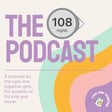
Episode 65- Nervous System Regulation and Diabetes with Brooke Stewart
Join us in this incredibly insightful conversation with our friend, Brooke Stewart. Do you notice blood sugars spiking coinciding with high energy/high stress situations? Brooke explains the science behind this, what you can do about it, and how to regulate your nervous system in order to contribute to diabetes management. We've already been putting some of her suggestions into practice and are seeing massive improvement!
Brooke Stewart's IG: https://www.instagram.com/sugarb_and_me?igsh=MzRlODBiNWFlZA==
Babysitters: https://www.typeonetogether.com/t1dbabysitting
Team Together: https://www.typeonetogether.com/teamtogether
T1D Diagnosis: Made Simple: https://www.typeonetogether.com/madesimple
Omnipod 5 Auto Mode Masterclass: https://stan.store/typeonetogether/p/auto-mode-masterclass
Tandem Control IQ Deep Dive: https://www.typeonetogether.com/tandem
Travel Masterclass: https://stan.store/typeonetogether/p/t1d-travel-masterclass
Navigating Nutrition Masterclass: https://stan.store/typeonetogether/p/-9m6nt
Masterclass Hub (Sick Day, T1D & School, Celiac) Coming Soon!: https://www.typeonetogether.com/copy-of-courses
Better Together Group Coaching: https://docs.google.com/forms/d/e/1FAIpQLSdOPsdNQGTBCBcx8IpFMwrTekVI0MsO1SLdcYurj1c1VtbL4A/viewform
T1D Grandparents Course: https://stan.store/typeonetogether/p/t1d-grandparents-course-
Super Parents Community on the Honey Health App: https://honeyhealth.app.link/28gQmJjyDsG
Products: https://www.typeonetogether.com/shop
Free Resources: https://stan.store/typeonetogether
Instagram: https://www.instagram.com/typeonetogether/
Tiktok: https://www.tiktok.com/@typeonetogether
Website: www.typeonetogether.com
Amazon Storefront: https://amzn.to/3VaKSD0
Facebook Group: https://www.facebook.com/groups/typeonetog




